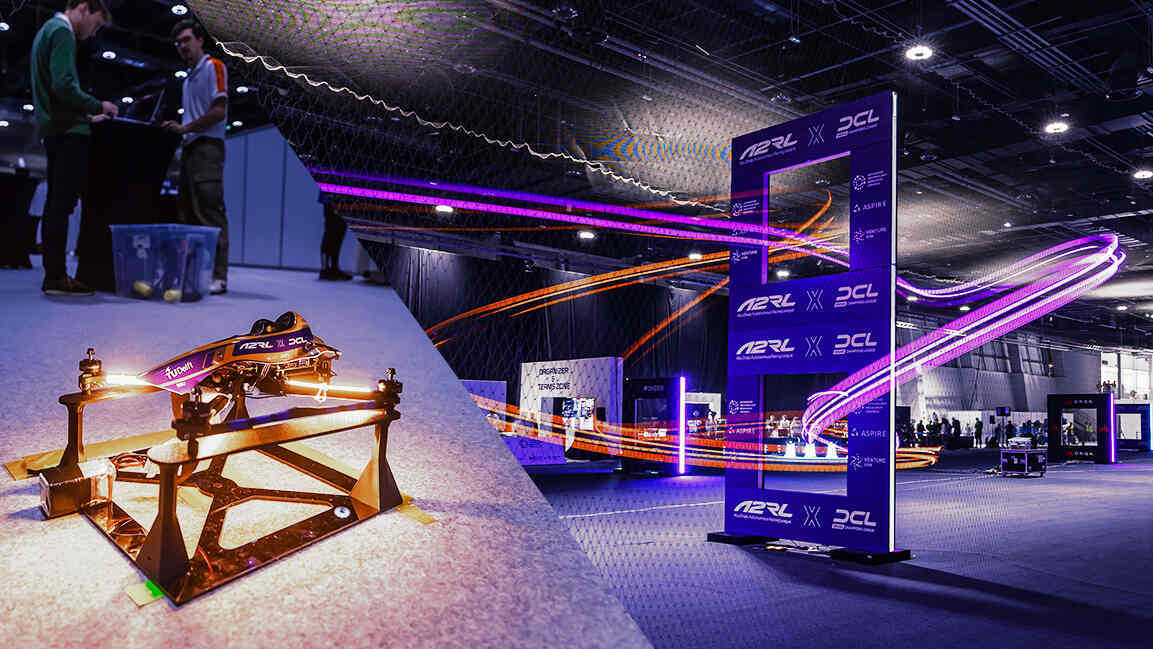- | 10:00 am
Can a drone race shape the future of autonomy?
From drone races to self-driving cars, A2RL offers a real-world look at where autonomous technology is heading

AI-powered drones, human pilots, and high-stakes racing—A2RL x DCL was a glimpse into the future of autonomy. AI-controlled drones outpaced some of the world’s best human pilots, while more than 100 Emirati students gained hands-on experience building and programming drones. The event spotlighted the UAE’s rising influence in autonomous tech. With Season 2 set to feature self-driving car races, the challenge and opportunities for innovation and talent development are evolving.
Stephane Timpano, CEO at ASPIRE and A2RL, shares how the championship is accelerating progress in AI, what beating a human pilot really means, and why global collaboration and local talent are key to shaping the future of autonomy.
THE AI BREAKTHROUGH
“What we witnessed at the A2RL x DCL Championship was more than just a thrilling race—it was a high-intensity testbed for real-world autonomy,” says Timpano. Fourteen teams worldwide competed across four advanced race formats, including the AI Grand Challenge, the first-ever autonomous drone drag race, and a multi-drone coordination challenge.
The breakthroughs, especially in onboard perception, split-second decision-making, and adaptive flight control, have clear applications across mobility, aerospace, and national security. “In mobility, these capabilities are essential for autonomous cars and air taxis navigating busy urban environments,” he explains. “In aerospace, they enable drone operations in shared airspace. And in national security, where missions are fast-moving and unpredictable, AI that can perceive, decide, and act independently opens up new possibilities in logistics, surveillance, and rapid response.”
He notes that the real challenge of autonomy isn’t simply flying but the ability to see, interpret, and react in real time. And that, he adds, is exactly what A2RL is designed to advance.
A highlight of the championship was when an AI-powered drone beat a top human pilot—proof, Timpano says, that AI has reached a new milestone.
“That was a defining moment,” he reflects. “An autonomous system outperformed one of the best drone pilots in the world, under elite race conditions. It wasn’t just symbolic but showed that AI can now equal, and even exceed, human performance in areas that demand speed, accuracy, and adaptability.”
Still, he clarifies, the aim isn’t to replace humans. “It’s about expanding the boundaries of what’s possible. AI can take on fast, repetitive tasks, letting humans focus on strategy and creative thinking.”
Such moments, he adds, also shift how people think about trust. “When autonomous systems succeed under pressure, it changes our willingness to rely on AI, not just in racing, but in real-world critical applications.”
TRAINING EMIRATIS
Over 100 Emirati students participated in the A2RL x DCL Drone STEM Program. More than half earned professional certifications, and 24 achieved perfect scores. Many of the top performers were young women, highlighting the depth and diversity of talent in the UAE.
That speaks to the depth and diversity of talent in the UAE.
He adds, “At ASPIRE, we’re nurturing that talent with mentorship, exposure to global experts, and participation in live testing environments like A2RL.”
He emphasizes that this is more than a STEM program but a national effort to prepare the future workforce and position the UAE as a global hub for autonomous technology talent.
The long-term goal is to position the UAE as not just a consumer of autonomy technology, but as a creator. Through the STEM program with UNICEF, he adds, “We’re providing students with hands-on experience in the systems that will shape the next generation of jobs and industries.” They’re building drones, writing algorithms, and diving into the mechanics of AI.
This initiative isn’t about theoretical exposure but is practical, applied learning, and it’s proving successful. However, the true impact extends beyond skill-building. It is about shifting mindsets.
Timpano emphasizes that these students are already contributing to the ecosystem, and in time, they will become the entrepreneurs, researchers, and policymakers shaping the future of autonomy in the region.
THE GLOBAL FOOTPRINT
Global collaboration is essential to Abu Dhabi’s ambition to lead in autonomous technology. A2RL isn’t just a local competition, it’s a global proving ground, highlights Timpano.
He says, “At the A2RL drone race, we brought together teams from 11 countries, including top universities, research labs, and high-growth startups. This diversity of expertise accelerates learning and injects fresh perspectives into a rapidly evolving field.”
Abu Dhabi is intentionally building a globally connected innovation ecosystem. Through ASPIRE and the Advanced Technology Research Council, Timpano says, “We’re inviting the best minds from around the world to tackle complex challenges together.”
Season 2 of A2RL marks a significant step forward in complexity and competition. Building on the foundational capabilities of Season 1, the new season enhances full-grid racing by incorporating more advanced multi-agent dynamics, sharper real-time strategy, and stronger failure recovery mechanisms. Cars will now face challenges such as GPS dropout, sensor degradation, and adaptive overtaking. Each scenario requires responsive, high-performance AI capable of making fast, intelligent decisions under pressure.
What is equally important is transparency.
Timpano highlights that “We’re focusing on building systems that offer clearer insights into how AI behaves and responds during races. By enabling a more understandable view of AI decision-making, we aim to support greater confidence from developers, regulators, and the public.”
As trust becomes a central pillar of autonomous mobility, A2RL aims to contribute meaningfully to the evolution of intelligent systems that balance speed, insight, and resilience.







































